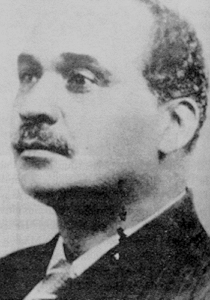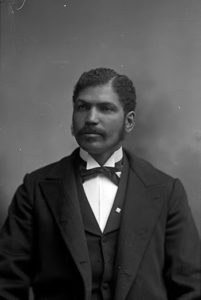
Robert F. Boyd
Robert Fulton Boyd was born on this date in 1855. He was a Black educator and doctor.
He was born in Giles County, Tennessee, and was the son of Maria Coffey and Edward Boyd. He was raised on a farm, and in 1866, his mother brought him to Nashville to live with Paul Eve, a surgeon with an international reputation. During his stay with Dr. Eve, he enrolled in night classes at Fisk University and dreamed of becoming a physician. In 1872, he hired General James H. Hickman, a real estate agent. Boyd worked half the day and attended school the other half, receiving no wages.
He left in 1875 and began teaching at College Grove in Williamson County, Tennessee. Boyd returned to Giles County the following year. He soon became the principal of the male school and the female department of Pulaski's public schools. Boyd entered the medical department of Central Tennessee College in 1880 and graduated with honors in 1882. After this, he practiced medicine and taught school in New Albany, Mississippi. He later returned to Nashville's Meharry Medical College as an adjunct professor of chemistry. While teaching, he entered the new dental department at Central Tennessee College, graduating with honors in 1886.
One year later, Boyd opened an office on North Cherry Street in Nashville to practice his profession among the less fortunate. By the turn of the century, he treated patients of all social and economic classes. Dr. Boyd was particularly shocked by the Black mortality rate. In his paper, "What are the Causes of the Great Mortality Among Negroes in the Cities of the South, and How is That Mortality to be Lessened?", he made some of the earliest and most astute observations regarding the physical conditions of Black Americans. Dr. Boyd used public forums, including Nashville churches, to help the Black public understand tuberculosis's causes, origins, and transmission, teaching them ways to combat this disease. In 1890, Boyd attended the University of Chicago's Postgraduate School of Medicine. In 1891, he received a Master of Arts degree from the University of Tennessee. Two years later, Boyd ran for mayor and a seat in the Tennessee General Assembly as a Republican. He returned to the Chicago school in 1892, specializing in the diseases of women and children.

His experiences in a Chicago teaching hospital proved highly beneficial to Meharry, as Boyd became a professor of gynecology and clinical medicine there in 1893. Central Tennessee College had not secured funds for a teaching hospital, but when the city opened a hospital close to the school, students gained privileges there. Blacks constituted almost half of the patient population. The wards and clinics were temporarily opened to Meharry students, but the city unexpectedly suspended the permission. This lost opportunity sparked the resourcefulness of Dr. Boyd, who founded Mercy Hospital in 1900, located at 811 South Cherry Street. Ten Black physicians, led by Dr. Boyd, organized a national fraternity of Black doctors, of which Boyd was elected president. This group was the Society of Colored Physicians and Surgeons, which later became the National Medical Association.
In the 1890s, he purchased a three-story brick house on Cedar Street for $14,000 (at the time), reportedly the most significant real estate transaction in Tennessee to a person of African descent. When Nashville's second Afro-American bank, People's Savings Bank and Trust Company, was organized in 1909, Boyd was elected president.
Death came suddenly to Dr. Robert Fulton Boyd on July 20, 1912, following an "attack of acute indigestion.” His mother, Maria Coffey, survived Robert Boyd.
The University of North Carolina at Chapel Hill,
Chapel Hill, NC 27599
(919) 962-2211